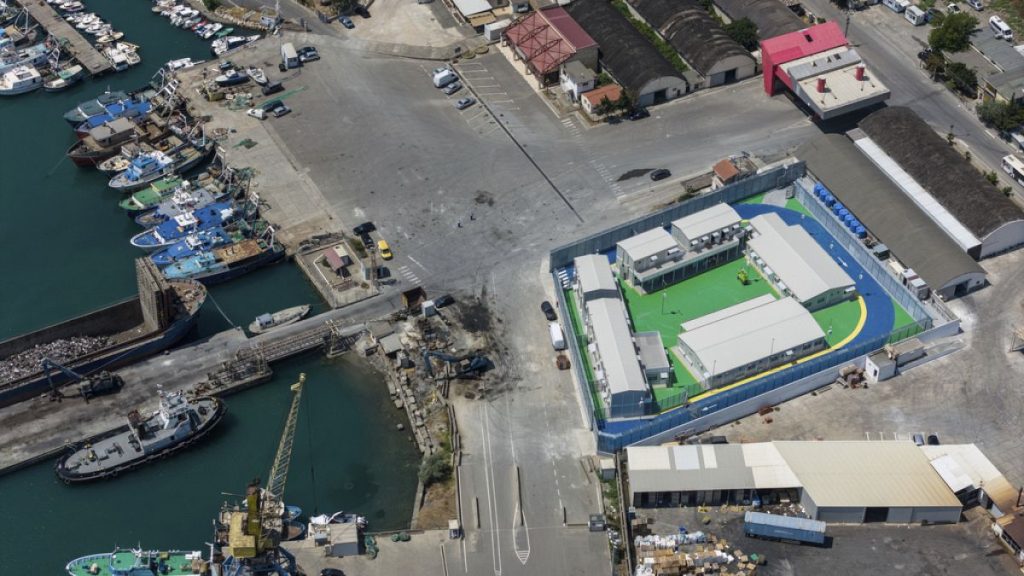Government-aligned MEPs have defended the plan to detain migrant arrivals in Albania rather than Italy, despite criticism from NGOs labeling the arrangement as “cruel”. The construction of two Italian migrant reception centers in Albania has faced delays, with no clear opening date in sight. Prime Minister Giorgia Meloni recently announced another postponement, indicating that the centers are unlikely to open before the end of the year. The controversial centers are part of a five-year agreement under which Albania will host migrant reception facilities funded and managed by Italian authorities. Forza Italia MEP Flavio Tosi has defended the plan, stating that the upfront costs of the centers are outweighed by the cost of managing migration. However, some organizations and opposition parties argue that the plan violates basic human rights, as it may lead to the detention of migrants for long periods, potentially breaching international law.
The Italian government asserts that the arrangement with Albania is a necessary measure to curb illegal immigration and relieve pressure on existing Italian reception centers. Under the agreement, Albania will host up to 36,000 asylum seekers annually on behalf of Italy, with Italian authorities determining their eligibility for repatriation. Despite criticism from organizations like Amnesty International Italy, which expresses serious concerns about the plan and the trend of shifting responsibility for processing migrant claims, MEP Tosi believes that Albania’s EU accession process ensures the protection of human rights. He also emphasizes the importance of strengthening relations with countries of departure, particularly in Africa. The externalization of asylum procedures is gaining traction among EU member states, with policies like Italy’s gaining interest in other countries, despite the potential challenges and costs involved.
Francesco Cherubini, a Professor of EU Law, explains that the externalization of migration policies gained momentum during the 2015 crisis in the Mediterranean. This approach is seen as effective because it prevents migrants from being directly under the authority of the final European country of arrival, thus potentially avoiding political consensus issues related to fundamental rights. However, Cherubini notes two significant problems with this model. Firstly, it entails handing migrants over to countries with potential human rights concerns, such as Libya or Turkey. Secondly, there are significant costs involved in implementing these externalization policies. Despite the controversies, the “Italian model” has garnered interest in other countries, with Great Britain having implemented something similar with Rwanda. However, the UK’s Rwanda policy faced challenges in domestic courts and was ultimately scrapped with the change of government in London.
The delayed opening of the Italian migrant reception centers in Albania highlights the ongoing dispute over the externalization of migration policies and the backlash from NGOs and opposition parties who view the plan as a violation of basic human rights. Amnesty International Italy has raised serious concerns about the potential implications of the plan, including the automatic detention of migrants for prolonged periods, which may breach international law. The Italian government continues to defend the necessity of the arrangement as a way to manage migration effectively and relieve pressure on the existing reception system. However, critics argue that the cost of opening the centers should not overshadow the potential violation of migrant rights and the need to ensure their fair treatment and protection.
The debate over the Italian-Albanian plan reflects broader trends in the EU towards externalizing asylum procedures and managing migration through agreements with third countries. This approach is seen as a way to address the challenges posed by increased migration flows while avoiding domestic political obstacles related to international protection and human rights concerns. Despite the potential advantages of externalization policies, such as preventing migrants from reaching European shores directly, the controversies and costs associated with these arrangements continue to spark debate and raise questions about the ethical implications of outsourcing asylum procedures. The Italian model has attracted interest from other countries, indicating a growing trend towards externalizing migration policies, albeit with potential challenges and criticisms to overcome.
The continuous delays in opening the Italian migrant reception centers in Albania demonstrate the complex nature of managing migration flows and addressing the issues surrounding asylum procedures. Despite government-aligned MEPs defending the plan as a necessary measure to curb illegal immigration, critics continue to voice concerns about potential breaches of human rights and the ethical implications of externalizing migration policies. The need to strike a delicate balance between managing migration effectively and ensuring the fair treatment and protection of migrants remains a key challenge for policymakers and stakeholders involved in shaping migration policies in the EU. As externalization policies gain traction among member states, addressing the challenges, costs, and ethical considerations associated with these arrangements will be crucial in shaping the future of migration management within the European Union.












